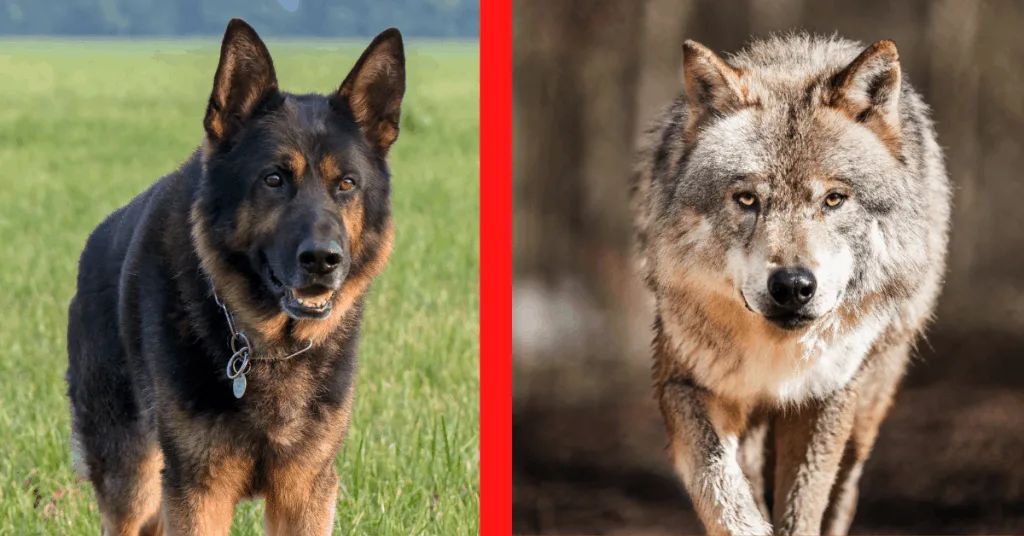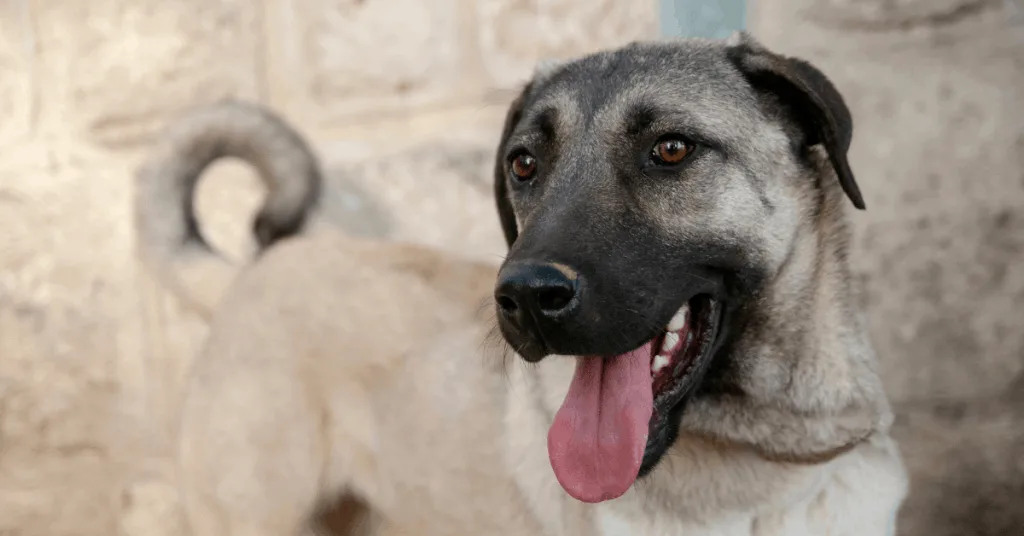
German Shepherds, while loyal and strong enough to fend off most attackers, may have met their match when it comes to wolves. So how do they match up – can a German Shepherd beat a wolf?
A German Shepherd cannot beat a wolf in a fight and would likely withstand serious injuries or get killed in the event of a wolf attack. Although they are very strong, German Shepherds do not have the physique necessary to withstand wolf bites or consistently force a wolf to back down.
This article will talk about the German Shepherd and wolves and what would happen if a wolf were to attack a German Shepherd.
We will also explore the possible scenarios when a GSD may come into contact with a wolf, and what you can do to keep you and your dog safe.
Click Here to Jump to a Section
Wolves and Dogs: Relatives With Big Differences
Wolves are the ancestors of domesticated dogs and used to inhabit most of North America until they were widely hunted by humans and destroyed their habitats. Now, they occupy only about 5-8% of the lower 48 states.
North America is home to red wolves and gray wolves, which can be broken into six distinct categories:
- Arctic Wolves (Gray wolf, Canis lupus arctos)
- Northwestern Wolves (Gray wolf, Canis lupus nubilus)
- Great Plains Wolves (Gray wolf, Canis lupus nubilus)
- Mexican Wolves (Gray wolf, Canis lupus baileyi)
- Red Wolves (Canis rufus)
All of the above are fierce predators and can pose a risk to their dog relatives, although they generally will not attack a dog unless their territory or food source is threatened.
Strength and Fighting
One way that the strength of a dog or wolf is measured is through bite force, calculated in pounds per square inch (psi).
The average dog’s bite force is 230-250 psi, twice that of a human. However, dogs with bigger jaws will have stronger bites than average.
The German Shepherd is among the strongest dogs and has a bite force of 238 psi on average.
Because of this and their focused, loyal temperament, they are often chosen as police and military dogs, as well as farmhands and guard dogs.
They are also sometimes used as hunting companions, although this is less common.
A German Shepherd can be aloof and aggressive with strange people and animals, but with good obedience training from a young age, they are not likely to attack unless provoked.
Wolves are much stronger, with a bite force anywhere from 400 psi to 1,200 psi, depending on whether the wolf is protecting itself or biting for another reason.
Although wolves do not prey on dogs, they are very territorial animals and are prone to attack if they find other animals encroaching upon their territory or are competing over a food source.
A wolf can easily kill a dog in a fight, whether it be a pet dog or a hunting dog, and so understanding risk factors for wolf attacks and how to defend against them is important to any dog owner.
When Is Your German Shepherd Is at Risk From a Wolf Attack?
Shepherding Livestock
German Shepherds are perhaps most at risk in use as guard dogs for livestock, as wolves may be attracted to herds as potential prey, depending on the location of the farm.
However, even well-trained guard dogs do not have the force or defenses necessary to square off against a wolf.
Most wolf attacks on livestock happen between May and October when livestock are left to graze in open pastures.
Grazing is especially high risk in areas near forest and brush, as well as near disposal sites of livestock carcasses.
However, shepherding dogs are overall rarely attacked and killed by wolves, despite the risk.
As an example, in the past five years in Minnesota, there was an average of 70 complaints per year of wolf attacks on dogs.
About five of these involved the death of farm dogs protecting livestock, a loss that can be compensated by the Department of Agriculture.
Hunting
Hunting dogs are also at risk, as wolves are very protective of their food sources, and a hunting dog may appear threatening if pursuing prey on a wolf’s territory.
While German Shepherds are unlikely to be used as hunting dogs, they do share some of the same risks in the backcountry.
Wolves are also very protective of their dens, especially when they have small pups or are protecting a fresh kill.
Backcountry Living or Hiking
These same risks are relevant when backcountry camping with your German Shepherd or living in the country, and so you should avoid areas likely to be home to wolves.
These are usually areas close to the edge or clearing of a forest, recognizable by wolf tracks, matted vegetation, and droppings.
You should also be careful not to leave food out in the open, which can attract wolves on the hunt.
How to Keep You and Your Dog Safe
Besides in the case of a few particularly strong species, the use of dogs as protection for livestock is now generally discouraged because they are at such a high risk of death or serious injury.
When hunting, be careful about using baits for bears or other animals and notice whether there are wolf tracks near a baiting site.
If there are, relocate to another hunting area in order to protect your dog.
You should also learn what your own dog’s tracks look like so that you can differentiate.
When camping with your German Shepherd or living in the country, avoid leaving your pets unattended outside.
Also, consider installing motion sensor lights that will help scare predators like wolves away.
You should never feed wolves or other wildlife, or feed your dog outside.
Additionally, make sure that any food garbage is stowed away in a can with a secure lid.
What to Do if You Encounter a Wolf
Before entering the backcountry, take precautions like researching wolf activity in the region and packing a whistle in case of an encounter.
If you encounter a wolf, the first rule is to keep as calm on the inside as possible.
This will not only give you the ability to think clearly, which is a absolutely necessary in this situation, but it will keep your dog calm as well.
Keep direct eye contact with the wolf and back away slowly, waving your arms and doing what you can to make yourself appear larger.
Throw objects at the wolf and make loud noises in order to scare it away, and blow through your safety whistle so that it produces loud, sharp, and inconsistent tones.
Following these guidelines will greatly increase the chances of successfully diffusing a dangerous wolf encounter.
Dogs That Can Take On Wolves
Although the German Shepherd is not strong enough to beat a wolf in a fight, there are some exceptionally strong dogs that could meet a wolf in strength in the best of circumstances.
A provoked wolf may still have twice the bite force of the strongest dog, but the following dogs are the most likely to meet the challenge of going against one.
| Breed | Bite Force |
| Kangal | 743 psi |
| Cane Corso | 700 psi |
| Dogue de Bordeaux | 556 psi |
| English Mastiff | 552 psi |
| Dogo Canario | 540 psi |
| Dogo Argentino | 500 psi |
The Kangal: A Dog Bred for Wolf-Fighting

However, some dog breeds fit to guard against not only wolves but bears, too, like the Kangal.
The Kangal weighs up to 145 lb (66 kg) and stands up to 33 in (84 cm) tall.
This makes a Kangal heavier and taller than other massive dog breeds, including Great Danes.
Kangals originated in Turkey, where they are valued for their ability to protect ranchers from wolves and thieves.
These dogs have an exceptionally thick coat to protect them against wolf bites, and their massive size and fearlessness often scare wolves away before they even attack.
They also have a very strong bite force, measuring at 743 psi.
As of 2009, American dog breeders in Montana have started importing Kangals.
The dogs are being studied by the U.S. Department of Agriculture and U.S. Fish and Wildlife Service, and are of interest to people who raise livestock.
Final Thoughts
Although wolf attacks on dogs are not common, especially outside the hunting context, wolves are likely to win the fight.
While German Shepherds generally make great guard dogs, they cannot be trained to match a wolf’s fighting skills and would likely be killed in the event of an attack.
The best action you can take is to make sure that your German Shepherd doesn’t come into contact with a wolf in the first place.
Alternatively, if an encounter is unavoidable, make sure to stay calm and follow the above guidance to the best of your ability.
